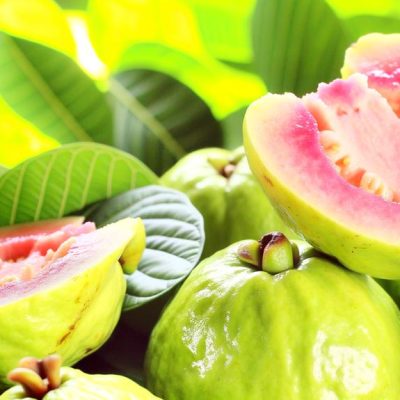How Guava Can Help Manage Diabetes Naturally
Guava can be a natural ally in managing diabetes. Its high fiber content slows sugar absorption, preventing spikes in blood sugar. The fruit’s low glycemic index also helps keep your blood glucose levels steady. Rich in vitamin C, guava boosts your immune system and fights inflammation. Additionally, antioxidants in guava combat oxidative stress and improve overall health. You can enjoy guava raw, in smoothies, or as tea to improve insulin sensitivity and support a diabetic-friendly diet. For practical tips on including this versatile fruit in your meals, there’s more you should definitely explore.
Key Takeaways
- Guava’s low glycemic index helps prevent blood sugar spikes.
- High dietary fiber content in guava slows sugar absorption, improving blood glucose levels.
- Guava leaves can be brewed into tea to enhance insulin sensitivity.
- Rich in antioxidants, guava combats oxidative stress and reduces inflammation.
- High vitamin C content in guava boosts the immune system and supports overall health in diabetics.
Nutritional Profile of Guava
Guava packs a nutritional punch with its high levels of vitamin C, dietary fiber, and antioxidants, making it an important ally in managing diabetes.
By incorporating guava into your diet, you can benefit from its essential minerals like potassium and magnesium, which support overall health and well-being. These minerals are vital for maintaining healthy blood pressure and nerve function, contributing to a balanced lifestyle that’s particularly beneficial for those managing diabetes.
You’ll also appreciate guava’s unique flavor, which makes healthy eating more enjoyable. The sweet and slightly tangy taste of guava can satisfy your cravings while providing essential nutrients. It’s important to focus on foods that not only meet your nutritional needs but also taste good, as this can make it easier to stick to a healthy eating plan.
Incorporating guava into your meals or snacks can help you get the most out of its nutritional benefits. You can eat it raw, add it to salads, or even blend it into smoothies. By doing so, you’re not just adding variety to your diet but also ensuring you get the essential vitamins and minerals your body needs.
Guava and Blood Sugar Control
Incorporating guava into your diet can help regulate blood sugar levels due to its low glycemic index and high fiber content. The low glycemic index means guava causes a slower rise in blood sugar, making it an excellent option for those managing diabetes. Research has shown that guava can reduce blood sugar spikes, which is essential for maintaining stable glucose levels.
Guava leaves also offer significant benefits. Studies indicate that compounds in guava leaves can improve insulin sensitivity and reduce blood sugar levels. You can easily take advantage of these benefits by brewing guava tea. To make guava tea, simply steep dried or fresh guava leaves in hot water for about 10 minutes. Drinking guava tea regularly can help you manage your blood sugar more effectively.
In addition to consuming guava fruit and tea, you might consider adding guava leaves to your meals. They can be used in salads, smoothies, or as a flavor enhancer in various dishes. By integrating guava and its leaves into your daily routine, you’re taking a proactive step toward better blood sugar control and overall health.
Remember to consult with your healthcare provider before making any significant changes to your diet.
Fiber Content and Diabetes
Dietary fiber plays an important role in managing diabetes by slowing down the absorption of sugar and improving overall blood glucose levels. When you consume guava, you benefit from its high fiber content, which includes both soluble and insoluble fiber types.
Soluble fiber dissolves in water to form a gel-like substance that helps slow digestion and stabilize blood sugar. Insoluble fiber, on the other hand, adds bulk to your stool and aids in regular bowel movements, ensuring a healthy digestive system.
By incorporating guava into your diet, you’re not just managing blood sugar; you’re also supporting your digestion. The digestion benefits of guava’s fiber content are essential for people with diabetes, as they help prevent blood sugar spikes after meals. Consuming foods rich in fiber can also make you feel fuller for longer, reducing the likelihood of overeating, which is important for weight management—a key aspect of diabetes control.
To maximize these benefits, try adding guava to your salads, smoothies, or eat it as a snack. It’s an easy and delicious way to boost your daily fiber intake and support your diabetes management naturally.
Antioxidants in Guava
Packed with powerful antioxidants, guava can play an essential role in managing diabetes by combating oxidative stress and inflammation. When you have diabetes, your body is more prone to oxidative stress caused by free radicals. These free radicals can damage cells and worsen complications. However, guava is rich in antioxidants like lycopene, quercetin, and various polyphenols that help neutralize these harmful molecules.
Incorporating guava into your diet can provide several benefits:
- Reduced Oxidative Stress: Antioxidants in guava can help lower the oxidative stress that contributes to diabetes-related complications.
- Improved Immune Support: The antioxidants present in guava not only combat free radicals but also bolster your immune system, making you less susceptible to infections.
- Anti-inflammatory Properties: Chronic inflammation is a common issue in diabetes. Guava’s antioxidants can help reduce inflammation, hence aiding in better management of the condition.
Vitamin C Benefits
Guava is an excellent source of vitamin C, which can help boost your immune system and improve overall health management in diabetes. Vitamin C plays an important role in providing immune support, especially for those managing chronic conditions like diabetes.
A strong immune system is essential because it helps your body fight off infections and maintain its natural defense mechanisms.
For individuals with diabetes, maintaining a robust immune system is particularly significant since high blood sugar levels can impair immune function. Consuming guava regularly guarantees you get an ample supply of vitamin C, which acts as a powerful antioxidant, reducing inflammation and oxidative stress associated with diabetes.
Furthermore, vitamin C is necessary for collagen formation, wound healing, and maintaining healthy skin. This can be especially beneficial for people with diabetes, who are often more susceptible to skin issues and slow-healing wounds.
Additionally, guava’s high vitamin C content helps in scurvy prevention, a condition caused by vitamin C deficiency.
Incorporating guava into your diet is a practical and natural way to enhance your vitamin C intake, providing you with both immune support and overall health benefits, essential for managing diabetes effectively.
Insulin Sensitivity Improvement
In addition to its high vitamin C content, consuming guava can also improve insulin sensitivity, an important factor in managing diabetes effectively. Guava enzymes play a vital role in enhancing your body’s ability to utilize insulin, making it easier to control blood sugar levels.
By improving insulin sensitivity, guava helps your cells take in glucose more efficiently, which is essential for maintaining cellular health.
To incorporate guava into your diet, consider the following practical tips:
- Eat it fresh: Simply peel and slice a guava for a quick, healthy snack.
- Guava juice: Blend fresh guava with a bit of water for a invigorating drink that retains the enzyme benefits.
- Guava salad: Toss guava chunks into your favorite salad for an extra boost of nutrients.
These simple steps can help you make the most of guava’s benefits.
Studies have shown that the bioactive compounds in guava, including its enzymes, can significantly enhance insulin sensitivity. This contributes to better overall glucose metabolism and helps manage diabetes naturally.
Low Glycemic Index
A notable advantage of incorporating guava into your diet is its low glycemic index, which helps stabilize blood sugar levels. Foods with a low glycemic index cause a slower rise in blood glucose, leading to a more controlled glycemic response. This is particularly beneficial for managing diabetes as it prevents spikes and crashes in blood sugar levels.
Guava’s low glycemic index means it is digested gradually, providing a steady release of energy. This gradual digestion helps keep you feeling full longer and reduces the temptation to snack on high-sugar foods.
Here is a comparison of guava with other common fruits:
| Fruit | Glycemic Index | Benefits |
|---|---|---|
| Guava | 12-24 | Low glycemic response, fiber-rich |
| Apple | 36 | Moderate glycemic response |
| Banana | 51 | Higher glycemic response |
| Mango | 60 | Higher glycemic response |
| Pineapple | 66 | Higher glycemic response |
As you can see, guava has a substantially lower glycemic index compared to other fruits. By choosing guava, you’re opting for a fruit that supports better blood sugar management. Including guava in your diet can be a practical step towards better diabetes control, making your journey to health more manageable and enjoyable.
Ways to Eat Guava
You can enjoy guava in various delicious ways to help manage your diabetes effectively. This versatile fruit can be incorporated into your diet in several forms, providing both variety and health benefits.
Here are three practical and tasty ways to enjoy guava:
- Guava Smoothies: Blend guava with low-fat yogurt, spinach, and a touch of honey for a nutritious smoothie. The fiber in guava can help control blood sugar spikes, making it an excellent choice for maintaining stable glucose levels.
- Guava Salads: Combine chopped guava with leafy greens, cucumber, and a light vinaigrette for an invigorating salad. The natural sweetness of guava pairs well with the crunchiness of vegetables, offering a balanced and diabetic-friendly meal option.
- Raw Guava: Simply eating guava raw is one of the easiest ways to enjoy its benefits. Slice it up and have it as a quick snack or add it to your breakfast routine. The fruit is rich in vitamins and has a low glycemic index, helping to manage your diabetes naturally.
Incorporating guava into your diet through these methods is a practical and enjoyable way to leverage its health benefits.
Tips for Daily Incorporation
To make guava a regular part of your diet, start by integrating it into meals and snacks you already enjoy. For instance, you can add guava slices to your morning cereal or yogurt. Guava’s natural sweetness pairs well with both, providing a burst of flavor without the need for additional sugar.
Smoothie recipes can be another excellent way to include guava in your daily routine. Blend guava with spinach, kale, or other low-glycemic fruits like berries to create a nutrient-packed beverage. Smoothies are quick to make and can be a great on-the-go breakfast or snack.
Consider brewing guava tea for a soothing, diabetes-friendly drink. You can use fresh guava leaves or dried guava leaf tea bags, both of which have been shown to help manage blood sugar levels. Simply steep the leaves in hot water for about 10 minutes, and enjoy it hot or cold.
Lastly, don’t overlook guava as a salad ingredient. Its unique texture and flavor can enhance a variety of salads, making them more enjoyable and diabetes-friendly. By incorporating guava into different aspects of your diet, you’ll not only add variety but also harness its natural benefits for better blood sugar management.
Frequently Asked Questions
Can Guava Leaves Also Help in Managing Diabetes Naturally?
Yes, guava leaves can help manage diabetes naturally. Drinking guava tea or using leaf extract may lower blood sugar levels. Studies show these methods can be effective, but always consult your healthcare provider before starting new treatments.
Are There Any Potential Side Effects of Consuming Guava for Diabetes?
When consuming guava for diabetes, you generally won’t experience significant side effects. Its high vitamin content and antioxidant properties support overall health. However, monitor your intake to avoid digestive issues like bloating or gas.
How Much Guava Should a Diabetic Person Consume Daily?
Imagine your body as a car needing premium fuel. For portion control and nutritional benefits, you should eat one to two small guavas daily. This helps manage blood sugar levels without overloading your system.
Is Guava Safe for Pregnant Women With Diabetes?
Yes, guava is safe for pregnant women with diabetes. Its rich nutrition can help curb pregnancy cravings without spiking blood sugar. However, you should consult your doctor to determine the right portion based on your condition.
Can Guava Interact With Diabetes Medications?
Yes, guava can interact with diabetes medications. Monitor your blood sugar levels closely and adjust medication timing if needed. Consult your healthcare provider to confirm you’re managing both diet and medication effectively for peak health.
Conclusion
Incorporating guava into your diet is like adding a powerful tool to your diabetes management toolkit. Its low glycemic index, rich fiber content, and abundant antioxidants work together to help regulate your blood sugar levels naturally.
By simply enjoying guava as a snack or adding it to your meals, you’re taking a practical step towards better health. Remember, small changes can make a big difference, and guava is a delicious, evidence-based choice to support your journey.











